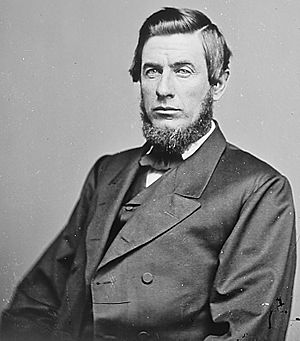Lucien Anderson facts for kids
Quick facts for kids
Lucien Anderson
|
|
|---|---|
 |
|
| Member of the U.S. House of Representatives from Kentucky's 1st district |
|
| In office March 4, 1863 – March 3, 1865 |
|
| Preceded by | Samuel L. Casey |
| Succeeded by | Lawrence S. Trimble |
| Member of the Kentucky House of Representatives | |
| In office 1855-1857 |
|
| Personal details | |
| Born | June 23, 1824 Fleming County, Kentucky |
| Died | October 18, 1898 (aged 74) Mayfield, Kentucky |
| Resting place | Anderson family cemetery |
| Political party | Whig Unconditional Unionist Republican |
| Profession | Lawyer State legislator |
Lucien Anderson (born June 23, 1824 – died October 18, 1898) was an important American politician from Kentucky. He supported the Union during the American Civil War. He also served as a U.S. Representative for Kentucky.
About Lucien Anderson
Lucien Anderson was born in Fleming County, Kentucky, near the town of Mayfield, Kentucky. While his first name is usually spelled "Lucien," some people spell it "Lucian."
Early Life and Career
Lucien went to public schools when he was young. He then studied law and became a lawyer in 1845. He started his law practice in Mayfield. He also held local government jobs, including serving as the Graves County Attorney.
In 1852, Lucien Anderson was a Presidential Elector. This meant he was chosen to cast a vote for president on behalf of his state. He voted for the Whig Party candidates, Winfield Scott and William Alexander Graham. From 1855 to 1857, he was a member of the Kentucky House of Representatives. This is part of Kentucky's state government.
Serving in Congress
In 1863, Anderson was elected to the Thirty-eighth Congress. He was an "Unconditional Unionist," meaning he strongly believed the United States should stay united, no matter what. His term in Congress lasted from March 4, 1863, to March 3, 1865.
Soon after he was elected, some people who supported the Confederacy kidnapped him. However, he was later released in a prisoner exchange. While in Congress, Lucien Anderson was a strong supporter of ending slavery. He voted for the 13th Amendment to the U.S. Constitution. This amendment officially ended slavery in the United States.
In 1864, he decided not to run for re-election to Congress. He also attended the Republican National Convention that year as a delegate.
Later Life and Legacy
After leaving Congress, Lucien Anderson went back to working as a lawyer. He passed away in Mayfield, Kentucky, on October 17, 1898. He was buried in the Anderson family cemetery.
Lucien Anderson's life is the subject of a book published in 2016. It is called Unconditional Unionist: The Hazardous Life of Lucian Anderson, Kentucky Congressman.
 | Lonnie Johnson |
 | Granville Woods |
 | Lewis Howard Latimer |
 | James West |

